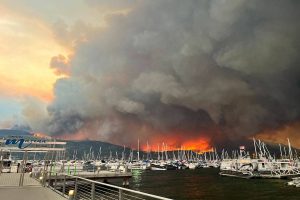Wildfire Preparedness for Canadian Boaters: Gallagher Skippers' Plan for Safety
Wildfires have long been a part of the Canadian landscape, but in recent years, their intensity and frequency have increased, particularly in regions like British Columbia, Nova Scotia and parts of Ontario. As temperatures rise and dry conditions persist, wildfires are becoming a more pressing concern—not just for our forests and homes, but also for our inland waters and boating communities.
Wildfires and Their Impact on Inland Waterways
 While wildfires are commonly seen as a threat to land-based ecosystems, their impact can extend to inland waterways as well. Smoke, ash, and particulates from wildfires can travel over long distances, affecting the air quality and water conditions in lakes, rivers, and other inland bodies of water. These particles can alter water quality, with potential consequences for the aquatic ecosystem. Wildfire ash has been shown to increase nutrient levels in the water, which can disrupt the delicate balance of marine ecosystems, potentially affecting fish, plants, and the broader food web that supports life.
While wildfires are commonly seen as a threat to land-based ecosystems, their impact can extend to inland waterways as well. Smoke, ash, and particulates from wildfires can travel over long distances, affecting the air quality and water conditions in lakes, rivers, and other inland bodies of water. These particles can alter water quality, with potential consequences for the aquatic ecosystem. Wildfire ash has been shown to increase nutrient levels in the water, which can disrupt the delicate balance of marine ecosystems, potentially affecting fish, plants, and the broader food web that supports life.
For boat owners, the risks are twofold. Not only do you face the threat of nearby fires, but the indirect dangers—like hazardous air quality, reduced visibility, and airborne embers—can also pose significant risks. As wildfires continue to become more frequent and intense, it’s crucial for Canadian boat owners to take proactive steps to protect their vessels and themselves.
Gallagher Skippers' Plan: Securing Your Boat During Wildfires
As a boater in Canada, particularly in regions at risk of wildfires, having a solid protection plan is key to safeguarding your boat. Whether your vessel is stored on land or in the water, these measures can help minimize the risk of damage:
- Move Your Boat to a Safer Location
If possible, relocate your boat to an area farther from known wildfire zones. If your boat is stored on land, ensure it’s placed in a location away from vegetation or other flammable materials. Secure it with heavy-duty straps to prevent movement in strong winds. - Double Check Moorings and Water Protection
If your boat is staying in the water, make sure mooring lines are properly secured and that extra fenders are in place. Wildfires can cause unpredictable winds, so ensuring your boat is anchored well can help protect it from damage caused by debris or shifting conditions. - Seal Openings
Wildfire embers can travel great distances in the air, so it’s important to close and seal all windows, hatches, and doors to keep your boat protected. Use fire-resistant materials if possible to provide an extra layer of security. - Remove Loose or Valuable Items
If time permits, remove detachable or valuable items like electronics, sails, or covers that could be damaged or lost in the event of a wildfire. - Document Your Boat’s Condition
Take photos or videos of your boat’s current state to document its condition before wildfire season starts. This could prove valuable for any insurance claims in the event of damage.
Personal Safety: Your First Priority
Your safety and that of your crew should always be the top priority. Wildfires can change direction and intensity rapidly, so having a comprehensive safety plan is essential. Here are some steps to keep in mind:
- Stay Informed: Regularly check updates from local wildfire monitoring systems and fire departments. This will help you make timely decisions about your boat and your safety.
- Develop an Evacuation Plan: Make sure all aboard know how to evacuate quickly and have a designated meeting point if separated.
- Emergency Gear on Hand: Keep fire extinguishers accessible, and ensure everyone on board knows how to use them. Install smoke and carbon monoxide detectors in enclosed spaces.
- Minimize Smoke Exposure: Wildfire smoke poses serious health risks. Limit exposure by staying indoors or wearing a mask designed to filter out harmful smoke particles.
The Impact of Climate Change on Wildfire Frequency
The increasing frequency and intensity of wildfires in Canada is closely tied to climate change. Rising temperatures, prolonged droughts, and shifting precipitation patterns create conditions that are more conducive to wildfires. These environmental changes not only threaten terrestrial ecosystems but can also affect inland waterways, altering water quality and impacting the aquatic life that depends on these environments.
As boaters, staying informed and prepared is essential. By understanding these evolving risks, you can take the necessary steps to protect your boat, crew, and safety on the water.
Gallagher Skippers' Commitment to Your Safety
At Gallagher Skippers, we understand the unique challenges that come with navigating the unpredictable threat of wildfires, especially in inland areas. Our goal is to help you stay prepared and keep enjoying your time on the water—no matter what challenges lie ahead. If you have any questions or need assistance with your boat insurance, please reach out to us.
For support, call us at 1-800.661.7211
If your boat has been damaged by a wildfire or another hazard, you can file a claim directly through our website .
Stay safe, stay prepared, and continue enjoying your time on the water—because at Gallagher Skippers, your journey matters to us.
